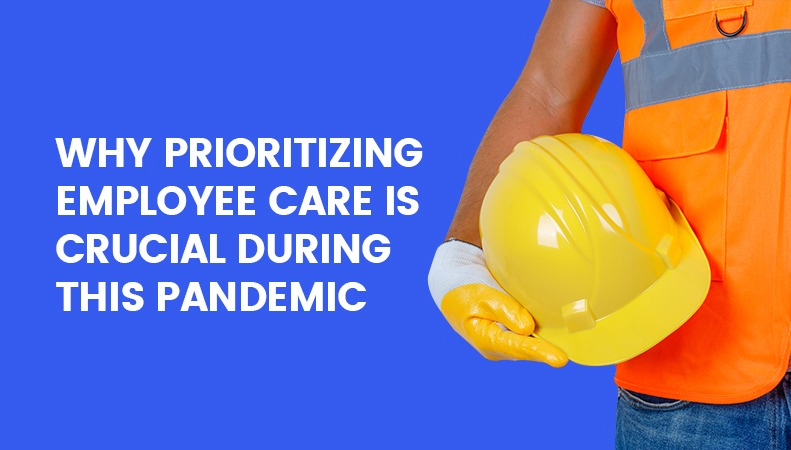
WHY PRIORITIZING EMPLOYEE CARE IS CRUCIAL DURING THIS PANDEMIC
18th August 2021
When most Malaysians were forced to stay at home during the first Movement Control Order (MCO), one of the most popular questions they were asked by their employers was, "How are you holding up?", and the chat would inevitably end with a phrase like "keep safe, stay well." Temperature screening, regulating employees' work schedules, checking up on their various physical and mental health concerns, or just getting in touch with individuals working from home who felt stressed by the lockdown were among the difficulties that companies authorised to operate during the MCO had to deal with.
Because of the increasing need to protect one's health, food stores and pharmacies, which stayed open for the most part during the pandemic, had to come up with innovative solutions. Leading retailers erected barriers at check-out counters to protect cashiers, constructed one-way passageways within stores and reduced the total number of customers in the store at any given time. Digital payments in Malaysia saw a surge in usage as people opted for cashless transactions. Fintech in Malaysia also took prominence in many people’s lives. However, physical health is only one aspect of happiness; mental health is just as important. Mental health was already a major, if mostly ignored, workplace issue before the advent that is COVID-19.
The COVID-19 pandemic has brought mental health to a new level of prominence. People have struggled with sadness over the loss of a loved one, isolation and loneliness, general fear about the future, and overload brought on by working long hours or juggling a job with other obligations such as childcare during the crisis. They might have been concerned about losing their employment as well.
Here are a few things that employers can do to help their teams in these trying times:
Improve Employees Financial Education
Education about protection is becoming widely regarded as a critical subject for enhancing people's overall financial literacy. This will improve their capacity to manage their money efficiently for a lifetime of financial security, including understanding everyday financial products and perks such as pensions and various types of insurance that are accessible to them at work. Before the COVID-19 pandemic, companies had a limited role in providing financial education and benefits advice. This was beginning to change.
Malaysian employers are expanding their financial services offerings to provide employees with on-demand digital payments. Malaysian Fintech businesses are now aiming to digitise cash-heavy industries, reduce physical checks, and prototype cheaper pay card products, fueled by tech-friendly rules and employee demand for faster payouts. Fintech companies now have a unique opportunity to assist employers who are struggling to scale earned wage access to all employee classes at a reasonable cost through easy access to a secure salary payout system.
Explore Alternative Work Sites Beyond Home And The Office
Consumers and employees alike want to know that they are working for a worthy cause. Discerning businesses with a heart would use this opportunity to do actual good, whether for their employees or communities, and will enjoy the benefit once the storm passes. Find innovative approaches to assist employees who are experiencing financial difficulties if possible.
Explore Alternative Work Sites Beyond Home And The Office
Employees may be unable to come into the corporate office as usual but working from home is not always an option — either because the nature of an individual's role is too sensitive to be carried out in an unprotected location, they require remote access to equipment or programs, or their home environment is unsuitable for work.
As a result, several businesses are looking into alternative work environments, such as disinfected coworking spaces. If you are contemplating this alternative, make sure you understand their sanitation procedures and schedules, as well as who has access to the facility. In the long run, more businesses may see the advantage in establishing a network of alternative workplaces where staff may remain productive in the event of an emergency.
Increase The Efficiency For Both Parties
Companies should think about putting together a dedicated cross-functional team (a business response and continuity office). A cross-functional team could organise the activities of various business units, monitor, and offer the essential information to senior management for further engagement with employees, customers and partners.
It is high time to assess important responsibilities and key positions, as well as form a team of interim successors in the event of a force majeure situation. Because top management is frequently on business travels, there is a greater chance that certain employees will be unable to work due to quarantine or illness. Under numerous conditions, businesses need to build an effective management decision-making process.
Determine how your organisation will safeguard the safety of employees who are required to be at work and are unable to work remotely (e.g., shop assistants, cashiers, drivers, etc.). Companies are re-evaluating their practices for maintaining excellent workplace hygiene, providing disinfectants and so on. Analyse your company's project priorities and focus your teams' efforts on the most vital and critical activities. Allow for greater freedom when it comes to low-priority chores.
Another thing employers should focus on is financial accessibility through the use of innovative tools and systems. Fintech in Malaysia is on the rise, and business owners can utilise this trend to add convenience, safety and efficiency for their employees. EVOLET is one such solution that offers access to a secure salary payout system for employees, including migrant workers and unbanked individuals. This accessibility comes with a host of features including e-wallet capabilities and access to basic necessities. EVOLET leverages on the infrastructure for digital payments in Malaysia to make the lives of workers and employers easier and safer, especially during this time of crisis.
EVOLET is a digital wallet app for migrant workers.
Learn more at https://evolet.io/
